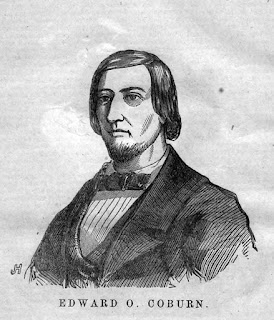A pair of attractive young ladies sat down at the table next to them. Nelly Dalton and Fanny Coburn were sisters, the daughters of John Gove, who owned a clothing store in Boston. Fanny recognized Mr. Porter and reminded him they had been introduced at a ball for the City Guards the previous February. The four struck up a conversation, and although both ladies were married, they became quite flirtatious. Before they left, they told the men that they often came to Vinton’s and hoped they would see them there again.
That November, Nelly began to worry about getting caught and asked Sumner to return her letters. He did so, but she did not destroy the letters he sent to her. Nelly’s husband, Benjamin Dalton, found them and confronted her. Nelly tried to shift the blame to Josiah Parker, but that only enflamed Fanny’s husband, Edward Coburn.
William Sumner had not responded to the letter, so the men went looking for him. They found him in a saloon on West Street. Sumner had never met Dalton or Coburn, so he did not know who they were. They told him that Mrs. Dalton was very anxious to see him, and they would drive them there in a carriage. Sumner declined, saying he had to catch a train to his home in Milton. The men said they would take him home. The men persisted, and Sumner reluctantly agreed to go with them.
They entered the house and went to the parlor, where he found the two sisters. The men revealed themselves as their husbands. An argument ensued, and Dalton asked Sumner if he had ever taken any improper liberties with his wife or had placed his hand upon her bosom. Sumner denied doing anything of the kind.Dalton said his wife had made such a charge, to which she replied, “I placed his hand upon my bosom; he did not. He never took any improper familiarities with me.”
This made Dalton even more furious. He and Coburn dragged Sumner to the basement, where they began pounding him with their fists. They beat him until they were satisfied and kicked him out the back door.
Josiah Porter filed charges against Dalton and Coburn, and they were free on bail, awaiting trial. Sumner did not go to the police and wanted to keep quiet about the beating. But Sumner was still in pain from the attack, and his health was deteriorating. On December 11, Sumner died. Dalton and Coburn were re-arrested, this time for murder.They also argued that the beating was not planned. The women sent for Sumner and Porter on their own initiative. The defendants planned to confront their wives and demand an explanation of their conduct, then let the men go. But when Sumner arrived, they saw he was wearing a ring that Dalton had given his wife at their wedding. This so enraged Dalton that he began beating Sumner.
The jury was deadlocked for five hours, with half for conviction for manslaughter and half for assault and battery. The jury finally agreed on the lesser charge. Coburn was sentenced to ten months in the jail and a fine of $250; Dalton was sentenced to five months in jail and a fine of $200. The discrepancy was probably because Coburn was much older than Dalton and believed to be the instigator.
The defendants were pleased with the verdict. As their attorney, R.H. Dana, expressed it, his clients were “delivered from blood-guiltiness.”
Sources:
)
“Errings Wives and Jealous Husbands,” Evening Star, September 28, 1855.
“Fatal Rsult of the Shawmut Avenue Cowhiding Affair,” Boston Evening Transcript, December 11, 1855.
“The Merry Wives of Boston,” The Brooklyn Daily Eagle, December 12, 1855.
“Sentence of Coburn and DAlton,” Bangor Daily Whig and Courier, March 8, 1856.
“The Shawmut Avenue Outrage,” Kennebec Journal, December 21, 1855.
“The Sumner Case in Boston,” New York Daily Herald, December 21, 1855.
“The Sumner Tragedy,” New England Farmer, December 22, 1855.













.jpg)











0 comments :
Post a Comment